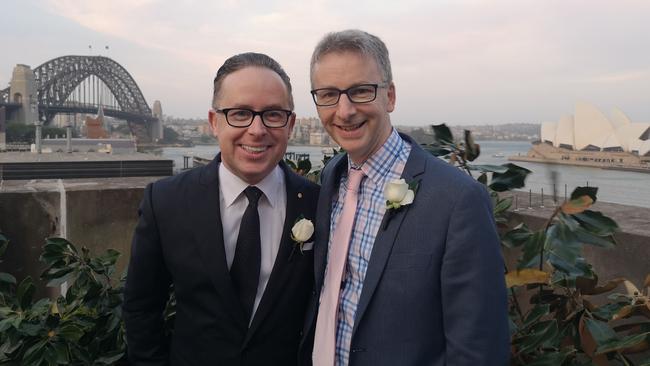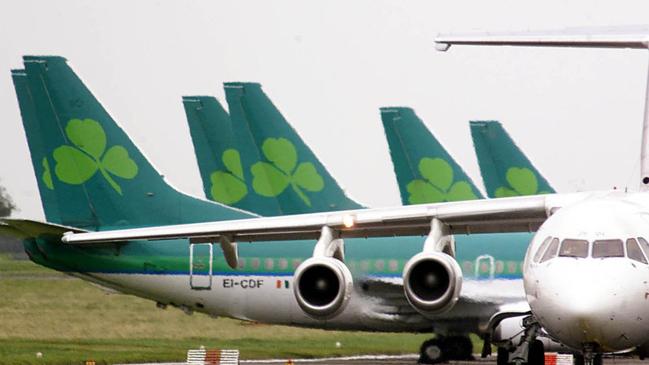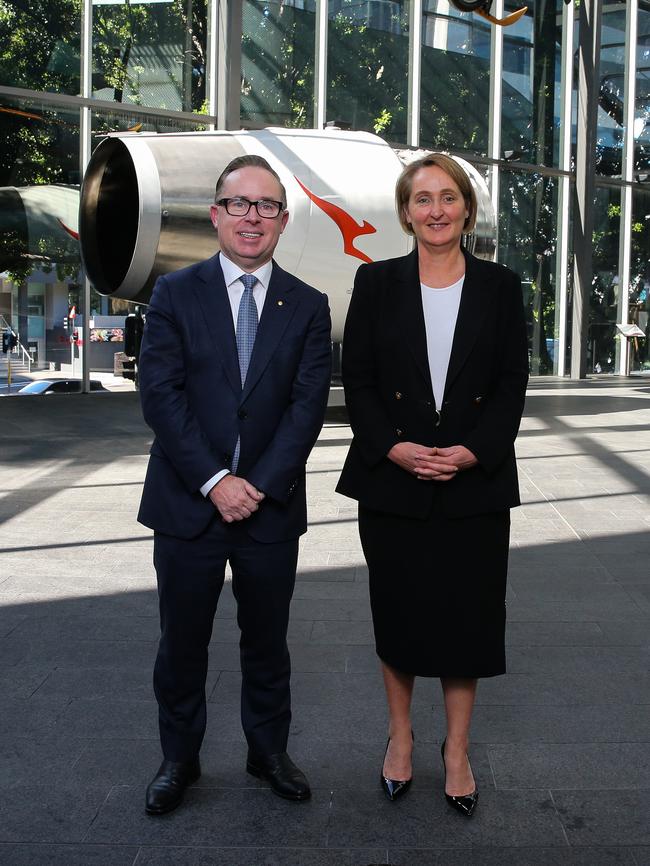How Alan Joyce and his brother Anthony use maths to strengthen their careers
Unlike his older and more high flying brother, Anthony Joyce knew exactly what he would like to do for a living when he was about 13 years old.

Business
Don't miss out on the headlines from Business. Followed categories will be added to My News.
Unlike his older and more high flying brother, Anthony Joyce knew exactly what he would like to do for a living when he was about 13 years old.
A teacher at school in Ireland gave him an A-Z careers guide and at top of the list was “actuary”.
Few people, let alone a teenager in the 1980s, would know what an actuary is but most companies would not be able to function without them.
Indeed, Anthony’s older brother Alan – who decades later found himself running Qantas after “falling into aviation” – oversaw the airline buying a 51 per cent stake in actuarial firm Taylor Fry in 2015, citing the growing importance of the function.
Actuaries form the backbone of key company decisions, using maths and statistics to complete modelling to manage risks and costs. In Qantas’ case an actuary was able to analyse data from across the company and forecast profitability on a route-by-route basis.
But back to the early 1980s, when all Anthony had was the careers guide.
“You had accountant, acupuncturist … and then three or four into the list it had actuary and in brackets ‘this requires high quality or high level of maths in year 12’ in Ireland, which is called the leaving series,” Anthony, 55, says in his first media interview.
“I thought that was really interesting. I didn’t know anything about it, so I organised a chat with a real actuary at an insurance company in Dublin and she was brilliant.”
Like Alan, Anthony studied applied science. Unlike Alan – and this is where a friendly sibling rivalry surfaces – Anthony graduated with first class honours and a university medal.
“We have always been competitive,” Alan, 56, says.
“But I have to admit that he was better than me at maths. He got first class honours and the university medal and that’s what allowed him to go on and do actuarial studies. So, it’s pretty clear he had the edge of me on maths.”

Alan said he discovered that he wanted to forge a career in aviation after he graduated and secured a job at Aer Lingus – Ireland’s national air carrier. And Anthony wasn’t far away to lend a hand.
“I’ll be honest, when I qualified – he did a masters degree and I came out of my sciences degree at roughly the same time in 1989. I remember we used to sit down when he was working at Aer Lingus,” Anthony says.
“He had to do this thing for an overbooking model. You overbook planes for 2, 3 or 4 or 5 per cent … because ultimately people don’t show up for the plane. If you get it (the percentage) right, then all your seats are filled.
“And he said ‘can you help me with this’. The model was actually applied by Aer Lingus for a number of years.”
Alan later developed a mathematical model to predict the optimum number of spare 737 engines for an airline to hold. Costing about £7m ($13.3m) at the time, having too many spare engines would be a waste of money, while too few would hit an airline’s profitability via the grounding of aircraft.
The brothers will jointly deliver the closing keynote address at the International Congress of Actuaries in Sydney on Wednesday.
It comes as companies are increasingly exploring artificial intelligence to perform actuarial tasks, with quantum computing set to further transform the profession in the next decade.

But Anthony – who is a corporate actuary at Medibank – believes that the rapid advances in technology won’t make actuaries redundant.
“There is always this big fear when new technology comes along – like the industrial revolution about 200 years ago, everybody thought all the jobs would go because you had machinery. But the job changed. We created new roles.”
He believes it will be the same with AI and quantum computers, which will be able to solve complex tasks and problems almost instantaneously.
“You think ‘oh well, actuaries are redundant because it could do all the work actuaries do’. But what will happen is somebody needs to check these to make sure that what’s coming out of these computers and AI systems is reasonable.
“Actuaries will develop in that way. When I started off, we had one computer in the office which meant we worked using paper, pen and calculators. Now computers do those calculations in an instant compared with what I used to do in the 1980s.
“So you can imagine that computing will just free up more time for us to think about the way the models should look and to solve more challenging problems.”
And one of the most challenging problems that cannot be solved with AI or a quantum computer is encouraging more students, particularly young women, to study STEM or science, technology, engineering and mathematics.
“There are not enough people doing STEM subjects in Australia. The big difference in Ireland is maths is compulsory to year 12, whereas here it’s a choice. In my view that’s crazy.
“Then if you combine that for women with the fact that these stereotypes are given at four or five years old where girls are taught almost that engineering is for boys. That’s why we have got such low representation in the actuarial profession. About a third of the actuaries in Australia are women, it’s about a quarter in the UK and roughly the same in the US as well.”
Parents also have a crucial role in helping break down such stereotypes and also encouraging maths. In the young Joyce household, Alan and Anthony’s parents – his late father Maurice and mother Colette – used mathematics cards to spark their boys’ interest.
As Alan recalls: “I always remember my dad getting those little cards out when we were very young kids and doing your times tables and then testing us with the cards to get us into it – that was probably the start of it.
“He was very passionate about education and spending the time on it. He was doing I think two or three jobs at the time and spending the time with his kids saying, ‘I‘m going to make your life better than mine. And I think education’s the way to do it’.”
But by the time Alan and Anthony’s younger brothers Maurice junior and Paul – who are now aged 54 and 51 – came round, the practice became a bit tiring for the parents.
“By the time the younger two came along to our age, they said ‘Oh God, we’re so tired’ and they just shoved them a packet of crayons and they started drawing.”

But Maurice and Paul weren’t disadvantaged. Maurice became an animator and made his directorial debut in 1999, ‘Doug’s 1st Movie’ – which Disney produced and made almost $US20m from a $US5m budget. Paul, meanwhile, is a successful graphic designer in Ireland.
“My dad was quite a good drawer as well and I think that’s where my younger brothers’ talents came from and they were encouraged to draw and take their artistic skills forward,” says Anthony.
“So it’s the parents, as long as they make it fun.”
For Alan, he says that early encouragement has helped throughout his career.
“As you progress through your career you have to be good at dealing with people. You have to be able to read people, motivate people, engage with people, talk to people. And that’s the key part of the job,” Alan says.
“But what the science of the mathematics part also gives you is a method of actually managing business problems.
“The scientific method, which I think I use quite a lot, is that you form a hypothesis on what you think the answer is going to be. And then you ask lots of questions to either disprove or prove what you think is the answer. I’ve always found that’s really helpful.”
Alan even uses maths to create boundaries between his personal and professional life.
“You have to be able to separate your work and home life and be able to switch off and leave work at work. I read books on maths in my spare time, they’re a great way to switch off.
I have Adam Spencer’s books, he will talk about the history of maths and any type of problem on it and try to solve those problems and put your mind to them, which I find relaxing.
“I’ve just been given a biography of Isaac Newton which is meant to be amazing, so that will be my next holiday reading.”
Hosted by the Actuaries Institute, the international congress will feature 400 speakers, including former High Court Justice and head of the banking royal commission Kenneth Hayne, former Lloyd‘s of London chief executive Inga Beale and the Australian Climate Council’s chief councillor Tim Flannery.
More Coverage
Originally published as How Alan Joyce and his brother Anthony use maths to strengthen their careers





